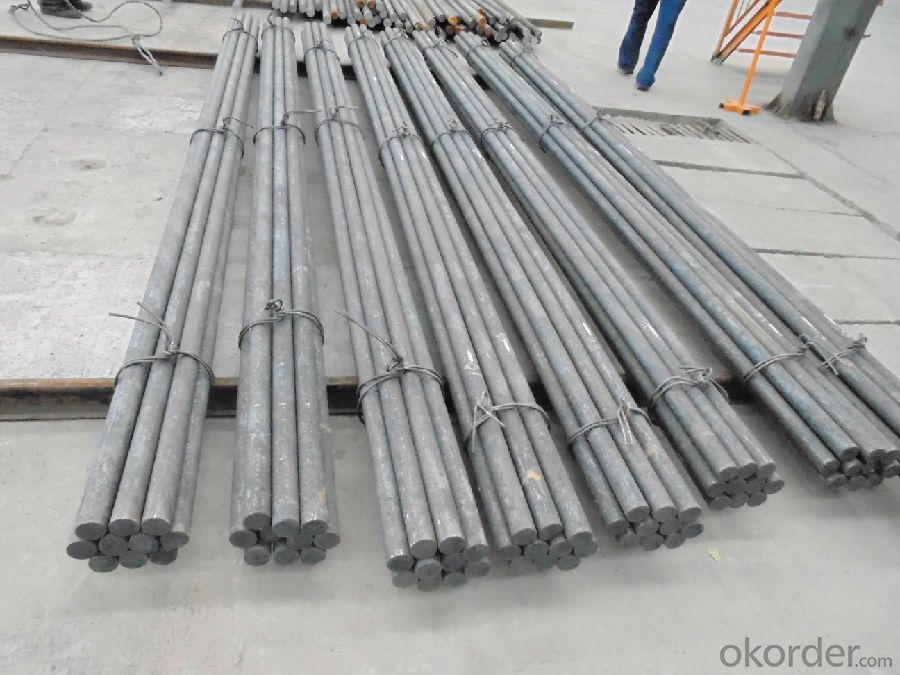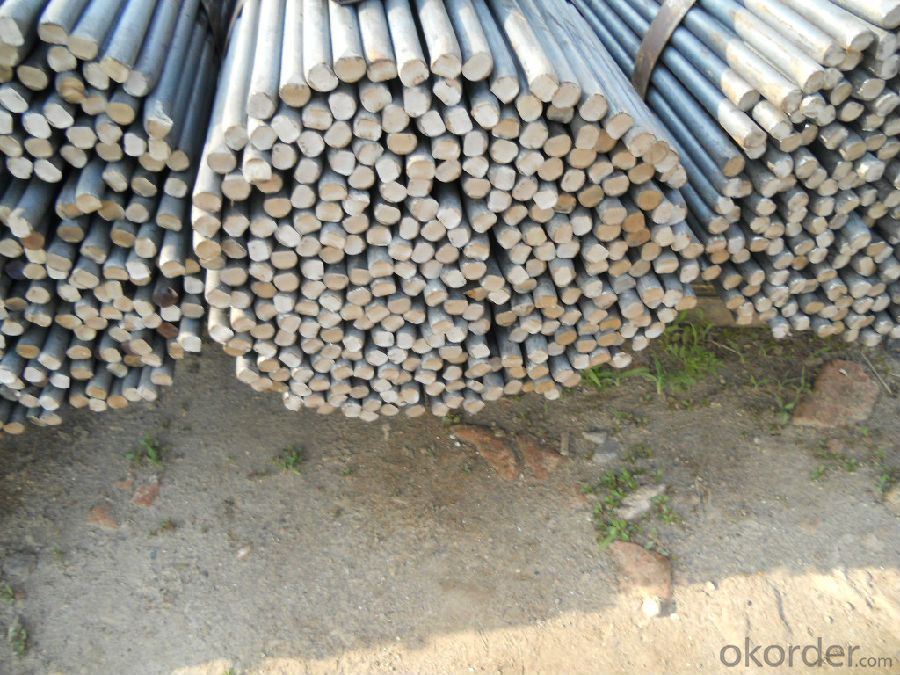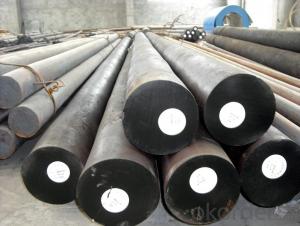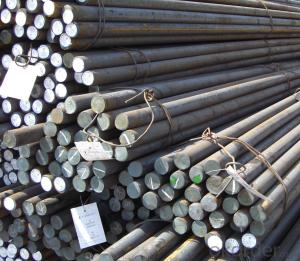Hot Rolled Prime Low Carbon Steel Round Bar
- Loading Port:
- China main port
- Payment Terms:
- TT OR LC
- Min Order Qty:
- 100 m.t.
- Supply Capability:
- 5000 m.t./month
OKorder Service Pledge
OKorder Financial Service
You Might Also Like
Product Description:
OKorder is offering Hot Rolled Prime Low Carbon Steel Round Bar at great prices with worldwide shipping. Our supplier is a world-class manufacturer of steel, with our products utilized the world over. OKorder annually supplies products to African, South American and Asian markets. We provide quotations within 24 hours of receiving an inquiry and guarantee competitive prices.
Product Applications:
Hot Rolled Prime Low Carbon Steel Round Bar are ideal for structural applications and are widely used in the construction of buildings and bridges, and the manufacturing, petrochemical, and transportation industries.
Product Advantages:
OKorder's Hot Rolled Prime Low Carbon Steel Round Bar are durable, strong, and wide variety of sizes.
Main Product Features:
· Premium quality
· Prompt delivery & seaworthy packing (30 days after receiving deposit)
· Can be recycled and reused
· Mill test certification
· Professional Service
· Competitive pricing
Product Specifications:
Manufacture: Hot rolled
Grade: Q195 – 235
Certificates: ISO, SGS, BV, CIQ
Length: 6m – 12m, as per customer request
Packaging: Export packing, nude packing, bundled
| ROUND BAR | |
| SIZE d(mm) | theoretical kg/m |
| 5.5 | 0.186 |
| 6 | 0.222 |
| 7 | 0.302 |
| 8 | 0.395 |
| 9 | 0.499 |
| 10 | 0.617 |
| 11 | 0.746 |
| 12 | 0.888 |
| 13 | 1.04 |
| 14 | 1.21 |
| 15 | 1.39 |
| 16 | 1.58 |
| 17 | 1.78 |
| 18 | 2 |
| 19 | 2.23 |
| 20 | 2.47 |
| 21 | 2.72 |
| 22 | 2.98 |
| 24 | 3.55 |
| 25 | 3.85 |
| 26 | 4.17 |
| 28 | 4.83 |
| 30 | 5.55 |
| 32 | 6.31 |
| 34 | 7.13 |
| 36 | 7.99 |
| 38 | 8.9 |
| 40 | 9.86 |
| 42 | 10.9 |
| 45 | 12.5 |
| 48 | 14.2 |
| 50 | 15.4 |
| 53 | 17.3 |
| 56 | 19.3 |
| 60 | 22.2 |
| 63 | 24.5 |
| 65 | 26 |
| 70 | 30.2 |
| 75 | 34.7 |
| 80 | 39.5 |
| 85 | 44.5 |
| 90 | 49.9 |
| 95 | 55.6 |
| 100 | 61.7 |
FAQ:
Q1: How soon can we receive the product after purchase?
A1: Within three days of placing an order, we will arrange production. The normal sizes with the normal grade can be produced within one month. The specific shipping date is dependent upon international and government factors, the delivery to international main port about 45-60days.
Q2: what is the difference between actual weight and theoretical weight?
A2: All the section steel has two weights: actual weight and theoretical weight. Actual weight is the weighing out when the product delivered from the mill. Theoretical weight is calculated by pieces. The invoice can be based on each of them as your request
Q3: How many tons of steel products could be loaded in containers?
A3: Usually the steel products are delivered by bulk vessel because of the large quantity and the freight. However, there are no bulk vessel enter some seaports so that we have to deliver the cargo by containers. The 6m steel product can be loaded in 20FT container, but the quantity is changed according to the size, usually from 18tons to 25tons.
Images:


- Q:How do steel round bars resist corrosion?
- Steel round bars possess corrosion resistance due to a variety of factors. To begin with, steel itself is an alloy primarily composed of iron and carbon. By incorporating other elements like chromium, nickel, and molybdenum, the corrosion resistance of steel is enhanced. These additional elements create a protective oxide layer on the steel's surface, acting as a barrier against corrosive substances in the surroundings. Moreover, steel round bars can undergo further surface treatments or coatings to augment their corrosion resistance. One commonly used technique is galvanization, which involves coating the steel with a layer of zinc. This zinc coating serves as a sacrificial layer, deteriorating before the steel itself is affected. Additionally, steel round bars can be coated with epoxy or other polymer coatings to provide an additional layer of safeguarding. It is also crucial to recognize that the manufacturing process and quality of the steel round bars significantly influence their corrosion resistance. Proper heat treatment, refining techniques, and quality control measures guarantee a homogeneous microstructure and minimal impurities in the steel, thereby reducing the probability of corrosion. In conclusion, the combination of alloying elements, surface treatments, and high-quality manufacturing processes contribute to the corrosion resistance of steel round bars, rendering them a dependable choice for applications in corrosive environments.
- Q:Can steel round bars be used for making fuel system components?
- No, steel round bars are not suitable for making fuel system components as they lack the necessary corrosion resistance and compatibility with fuels.
- Q:Can steel round bars be machined easily?
- Yes, steel round bars can be machined easily due to their excellent machinability properties.
- Q:How do steel round bars perform under static or stationary loads?
- Steel round bars perform exceptionally well under static or stationary loads. Due to their high tensile and compressive strength, they can withstand heavy loads without significant deformation or failure. The structural integrity and stability of steel round bars make them a reliable choice for various applications where static or stationary loads are involved.
- Q:What are the different surface roughness options for steel round bars?
- Steel round bars offer several surface roughness options, which are determined by the manufacturing process and the intended end-use. 1. Hot Rolled bars have a rough and scaled surface due to the high temperature during formation, causing oxidation and scale formation. The degree of roughness varies based on the manufacturing process. 2. Cold Drawn bars, processed at room temperature, provide a smoother surface finish compared to hot rolled bars. The cold drawing process reduces diameter through a die, resulting in a more consistent roughness. 3. Peeled and Polished bars undergo a secondary process to eliminate scale and surface defects. This involves peeling the outer layer and polishing the surface for a refined finish with minimal imperfections. 4. Ground bars are processed using a grinding machine to achieve precise and smooth surface finish. Irregularities and defects are removed, ensuring a uniform roughness. These bars are ideal for applications requiring dimensional accuracy and a smooth surface. 5. Turned and Polished bars are processed on a lathe machine, removing the outer layer using a cutting tool. This process yields a smooth and polished finish, making them suitable for applications where aesthetics and high-quality surface are crucial. Ultimately, the choice of surface roughness option for steel round bars depends on specific application requirements. Factors like dimensional accuracy, surface finish, and aesthetics influence the most suitable option for a given use case.
- Q:What are the different types of steel used in manufacturing round bars?
- There are several types of steel used in manufacturing round bars, including carbon steel, alloy steel, stainless steel, and tool steel. Carbon steel is the most common type, known for its high strength and affordability. Alloy steel contains additional elements such as chromium, nickel, and molybdenum to enhance its properties like corrosion resistance and toughness. Stainless steel is highly resistant to corrosion and can withstand high temperatures, making it ideal for applications in the food and chemical industry. Tool steel is specifically designed for tools and dies, offering high hardness, wear resistance, and toughness.
- Q:How are steel round bars inspected for quality?
- To ensure that steel round bars meet the necessary standards, various methods are utilized to inspect their quality. Typically, the inspection process encompasses both visual examination and testing procedures. The initial step in evaluating the quality of steel round bars involves visual inspection. Qualified inspectors visually examine the bars for any surface defects, including cracks, scratches, dents, or other irregularities that could potentially impact the structural integrity or performance of the bars. Moreover, dimensional inspection is carried out to verify the diameter, length, straightness, and overall shape of the round bars. Precision measuring instruments are employed to ensure that the bars adhere to the specified tolerances and requirements. In addition to visual inspection, diverse testing methods are employed to assess the mechanical properties and chemical composition of the steel round bars. The most common testing procedures encompass: 1. Tensile Testing: This test measures the strength and ductility of the steel bars by subjecting them to tension until they fracture. It aids in determining the ultimate tensile strength, yield strength, and elongation of the material. 2. Hardness Testing: It is performed to determine the hardness of the steel round bars, which serves as an indicator of its resistance to deformation or wear. The Rockwell, Brinell, and Vickers hardness tests are commonly utilized for this purpose. 3. Ultrasonic Testing: This non-destructive testing method utilizes high-frequency sound waves to detect any internal defects or discontinuities in the steel bars. It facilitates the identification of flaws such as cracks, inclusions, or voids that may negatively impact the material's quality. 4. Chemical Analysis: Steel round bars undergo chemical analysis to determine their chemical composition and ensure they meet the required specifications. This analysis helps verify the percentages of different alloying elements present in the steel, thereby ensuring it possesses the desired properties. All these inspection methods are carried out by well-trained professionals or certified third-party inspectors who possess extensive knowledge of the specific industry standards and guidelines. Through the combination of visual examination and precise testing techniques, the quality of steel round bars can be comprehensively assessed, guaranteeing their suitability for their intended applications.
- Q:Can steel round bars be used for hydraulic applications?
- Yes, steel round bars can be used for hydraulic applications. Steel is known for its strength and durability, making it a suitable material for hydraulic systems that require high pressure and heavy loads. Steel round bars can be used to manufacture various hydraulic components such as cylinders, pistons, shafts, and valves. The hardness and corrosion resistance of steel also make it a reliable choice for hydraulic applications where the fluid may contain contaminants or have high temperatures. However, it is important to consider the specific requirements of the hydraulic application and select the appropriate grade and type of steel round bars to ensure optimal performance and longevity.
- Q:What are the advantages of using nickel-molybdenum-chromium alloy steel round bars?
- The advantages of using nickel-molybdenum-chromium alloy steel round bars include excellent corrosion resistance, high strength and toughness, good weldability, and the ability to withstand extreme temperatures and pressures. These properties make the alloy steel round bars suitable for various applications in industries such as oil and gas, aerospace, and chemical processing, where durability and reliability are essential.
- Q:Can steel round bars be used for making drill bits?
- Steel round bars cannot be utilized in the production of drill bits. Drill bits necessitate distinct materials and manufacturing techniques to guarantee their endurance and efficacy. Typically, drill bits are crafted from high-speed steel (HSS), cobalt steel, or carbide. These materials are selected for their hardness, heat resistance, and ability to endure the substantial forces and temperatures generated while drilling. Conversely, steel round bars are not purposely designed or manufactured to meet the requirements of drill bits. Implementing steel round bars in the production of drill bits would result in substandard performance, heightened abrasion, and potential fracture during drilling activities. It is imperative to employ drill bits that are specifically designed and manufactured for this purpose to ensure efficient and secure drilling operations.
1. Manufacturer Overview |
|
|---|---|
| Location | |
| Year Established | |
| Annual Output Value | |
| Main Markets | |
| Company Certifications | |
2. Manufacturer Certificates |
|
|---|---|
| a) Certification Name | |
| Range | |
| Reference | |
| Validity Period | |
3. Manufacturer Capability |
|
|---|---|
| a)Trade Capacity | |
| Nearest Port | |
| Export Percentage | |
| No.of Employees in Trade Department | |
| Language Spoken: | |
| b)Factory Information | |
| Factory Size: | |
| No. of Production Lines | |
| Contract Manufacturing | |
| Product Price Range | |
Send your message to us
Hot Rolled Prime Low Carbon Steel Round Bar
- Loading Port:
- China main port
- Payment Terms:
- TT OR LC
- Min Order Qty:
- 100 m.t.
- Supply Capability:
- 5000 m.t./month
OKorder Service Pledge
OKorder Financial Service
Similar products
New products
Hot products
Hot Searches
Related keywords































